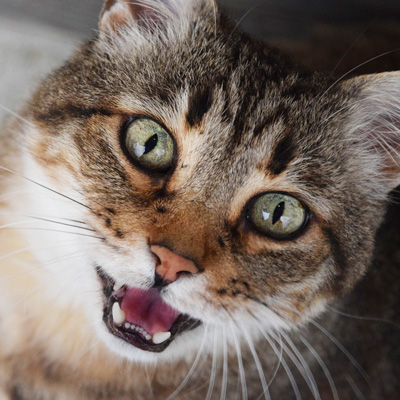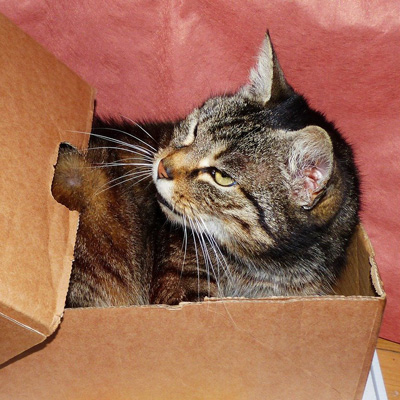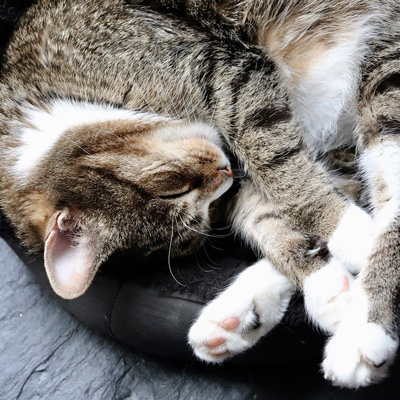Why does your cat cry at night? • Crying for Reassurance? • Meowing through Boredom? • Seeking Attention? • Age Related? • Medical Conditions?
Common Causes of Cats Meowing at Night
 One of the most regular complaints from cat owners, is of their cat's loud 'crying' in the middle of the night. This behaviour is unfortunately very common, particularly in older cats. Usually the cat just wants attention and reassurance that her humans are still around and she has not been left on her own. Cats often meow during the day as well, but the night call can seem much louder and more demanding!
One of the most regular complaints from cat owners, is of their cat's loud 'crying' in the middle of the night. This behaviour is unfortunately very common, particularly in older cats. Usually the cat just wants attention and reassurance that her humans are still around and she has not been left on her own. Cats often meow during the day as well, but the night call can seem much louder and more demanding!
Older cats do not move as fast or as easily as they did when they were younger, and sometimes, they find it easier to call for their humans, rather than going to them. Older cats in general tend to depend more on their humans not only for food and accommodation, but also for reassurance.
Younger cats may also get into the habit of 'crying' in the middle of night, sometimes through boredom, but often because they may be feeling anxious. This could be due to changes in their environment, or perhaps if they've moved house.
Conditions such as hyperthyroid can also cause a cat to meow during the night. So if this is a new behaviour for your cat, or the cat is elderly, your vet can take a blood sample to test for any underlying conditions.
Meowing can become a Habit!
Cats are intelligent creatures, and they can learn pretty quickly what works for them and what doesn't. So as the cat owner will go to check on the cat because she/he worries that the cat is in some form of distress, this will soon become a habit. The cat has now learned that this form of behaviour works and it will get her the attention she wants. By getting up and checking on the cat we ourselves are unintentionally reinforcing this kind of behaviour (our cats 'train' us to do what they want us to do!)
If cats become used to being fed at 6 in the morning, they will demand to be fed at that time everyday (even weekends or holidays!). They have made a direct association of their human getting out of bed with being fed, and will meow to their human(s) every morning to get up and feed them when they feel hungry.
Solutions to Help Break the Habit
Establish a Better Routine
Routines help cats to feel relaxed and secure. So by establishing a general routine for feeding, attention and play times you can avoid situations that might upset and stress the cat. Such a routine could also include for example, having a little play session with her just before bed time, to use up some of the energy built up through the day (particularly for indoor cats that tend to sleep most of the time, when their humans are not at home). This could then be followed with some food; perhaps half of her dinner kept back from her mealtime. If she is tired and full she should sleep more soundly, and be less likely to get up early and begin meowing.
Because cats are creatures of habit and routine, if you are going to break one of their established routines then you will need to establish another for them. So instead of going to the cupboard to feed the demanding cat immediately on getting out of bed, do something else first, and wait for at least 10 minutes before attending to the cat's need. This way the cat will not make the direct association of her human getting up with feeding her or letting her outside. As a result the cat will stop bothering her human(s) to get up.
Relieve Boredom
It is also important that the cat has things to do when she wakes up. For example, if she has toys to play with, or some hidden toys for her to find. Perhaps leave some paper bags or cardboard boxes for her to entertain herself, so she doesn't feel bored and start meowing to get attention.
Also it is a good idea to leave some biscuits around for her to eat, or hide a few biscuits or treats for her to find. In this way, not only will she have something to munch until her regular feeding time, but also searching for her treats will keep her entertained, and therefore she is less likely to begin meowing.
Older Cats
When an older cat begins to meow at night, a check-up at the vets is a good idea. Increased meowing can be a sign of medical conditions such as hyperthyroid, and a simple blood test will check for this. Louder meowing - at any time of day - could also be due to some loss of hearing, so ask your vet to test her hearing while you are there.
An older cat's eyesight may not be as good as that of a youngster, so having plug-in night lights at points where she needs to navigate to in the dark, will save her getting lost or confused. It can also be a good idea if she is not left alone at night, for example being left downstairs while her humans are sleeping upstairs. It will help to reassure her if she can get to her human's room if she wants to.
If your senior cat sometimes seems bewildered, check out the International Cat Care (formerly FAB) page on Elderly Cat Care.
Don't Give In!
 If medical conditions have been ruled out, and it seems your cat is simply meowing out of habit, to get attention, then it's important for the cat to learn that meowing doesn't get her anywhere. So you must try to ignore her, and not to give in one night and try again the next. This will confuse the cat and it will simply make things worse.
If medical conditions have been ruled out, and it seems your cat is simply meowing out of habit, to get attention, then it's important for the cat to learn that meowing doesn't get her anywhere. So you must try to ignore her, and not to give in one night and try again the next. This will confuse the cat and it will simply make things worse.
Ignoring the cat means that you don't even talk to her, pet her or even look at her, as this will only re-inforce the idea that meowing for attention works! Solutions such as burying one's self under the covers, wearing earplugs or listening to music etc. can be tried as long as the human doesn't give in to the cat's night cries.
After a few nights (depending on the individual cat) she will have learned that meowing doesn't work, and it is also possible in some cases to adapt to her human's sleeping routine.
Further Information:
Remedial Products
Feliway Classic spray and diffuser reduces stress in cats and promotes a calm environment: www.feliway.com/uk. There is also a calming spray called Pet Remedy which may help, and is available from most vets.
Behavioural Advice:
Websites offering behavioural advice can be found here: Useful Links section - Pet Behaviour
Our grateful thanks go to: K.Zurbanu BSc (Hons) (Psych) BSY(PetPsy) for advice and information when compiling this page, and to Feliway for sponsoring it. Thank you!



